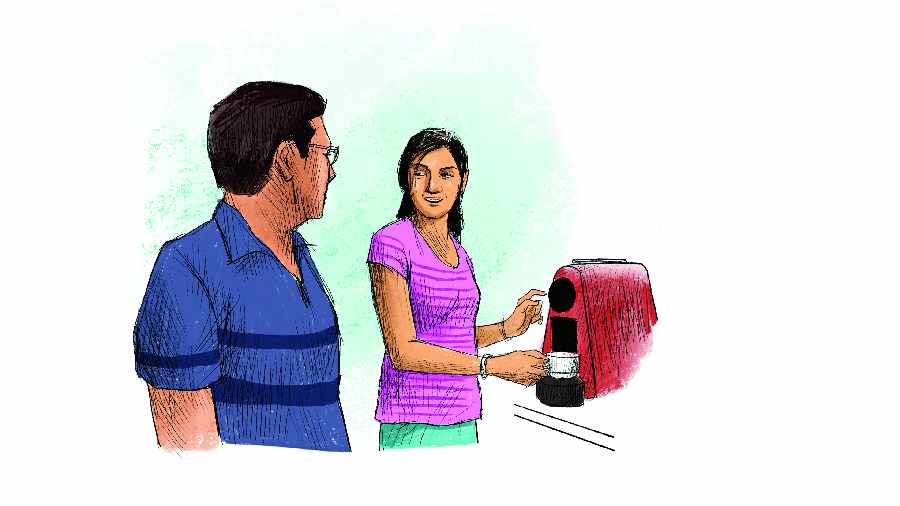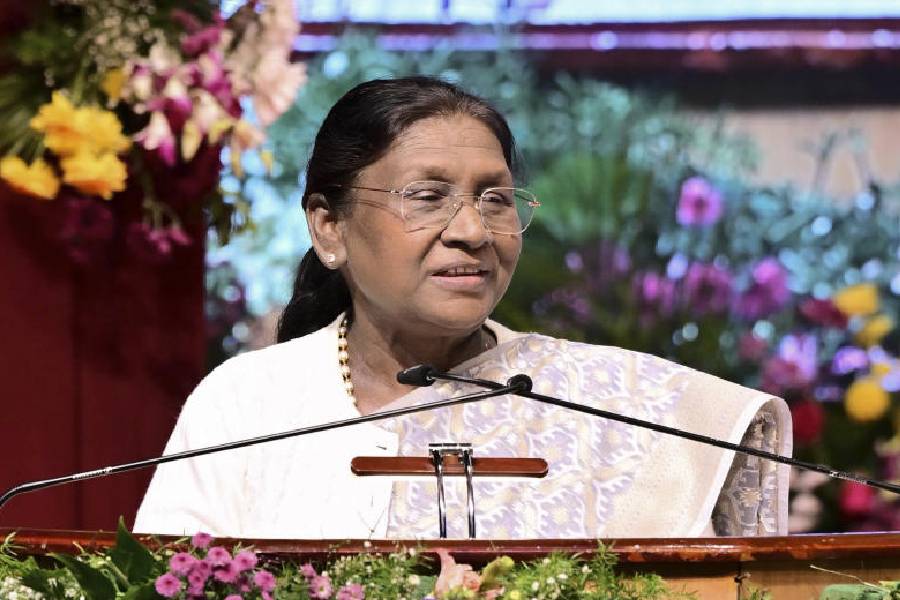Recap: Saahil cannot get over the fact that Seher left his life without so much as a goodbye. But with Ambika around, he might forget.
This was a sight that calmed Seher’s spirit. Four children’s heads bent over four open textbooks of Oxford’s Circle poetry at a row of white desks. The only thing that marred the picture was that the three eight-year-old boys were trying desperately not to squirm as they read She Walks In Beauty by Lord Byron. And her one seven-year-old girl was trying very hard to love the poem, but finding it nearly impossible, as she squinted and underlined, squinted and underlined.
Why their uppity school gave children things written in iambic tetrameter 200 years ago, Seher would never understand. A lover’s ode that had words like ‘climes’ and ‘o’er’ was not going to make sense to an eight-year-old who had just watched Dragon Ball Z or Dora The Explorer at home. No wonder they all hated reading. Lord Byron, and the stuffy, unrelatable likes of him, was all they thought literature was.
“Okay,” she said, after they had spent a majority of the hour memorising the words that made very little sense to them. “I have a little treat for you.”
The children looked at Seher, surprised. The boys glanced at Jaspal’s exercise bike in the corner, hopefully. This was the point in the lesson Seher usually let them clamber onto the stationary bike or the treadmill in the corner of the class, and put some music on, for them to lark around as a reward if they’d completed their work for the day.
“In a minute,” she said, pulling out little bags from under the table. “First these.”
Her students looked at the four goodie bags, delighted. Their teachers usually gave out homework, not gifts. The boys scrambled to examine the contents. The little girl peered in, very delicately. A tentative smile seemed to spread across all four faces. There was a Mars bar, a Snickers bar and a copy of Willy Wonka And The Chocolate Factory by Roald Dahl, all taped together.
She knew it was manipulative. Their tony mums were the helicopter sort that didn’t let any sugar into the mouths of their perfect children. But really, if rotting their teeth a little induced them to love reading and prevented the rotting of their brains, wasn’t that an overall positive?
“If you read that over the weekend,” Seher said, we’ll have a little book party with cake in the next class. “But you have to be able to discuss the book. I want to know who your favourite character is.”
Krish, the sweet-faced boy with the floppy hair, took a big bite of his Mars bar and looked at her cajolingly. “Do we have to read the whole book?”
“Yep,” she said. “And I’m taking one bar back from each of you. You’ll get it at the party. After you tell me which character you liked best.”
“Is this necessary?” Rohan, the tall boy asked. Seher smiled. His mum had asked her the same thing when she shared the lesson plan with her. In the exact same tone.
“It’s on your Diwali holiday reading list anyway,” Seher said, with a smile. “We’re giving you a bit of a head start, so by the time the book report rolls around you’ll have already done the work.”
“Yes but is it urgent?” Aryan prompted. Again, exactly like his mum.
“It’s only as urgent as your hunger for chocolate-covered peanut butter.”
And in one swift move, she snicked the Snickers bars back from each of them. They looked at her, their eyes wide in shocked betrayal.
“Evil,” Rohan said with respect.
She grinned. “Yes,” she said. “So you better not cross me.”
But she put on Wavin’ Flag, the Fifa song, on Jaspal’s sound system and the boys all seemed happy enough to get up and start running around the treadmill. She never turned it on, of course. They just let loose, in the last few minutes before their mums or drivers came to pick them up.
And while the boys were distracted, she turned to the little girl. “Amyra,” she said. “Your gift is a little different.”
The shy little girl nodded at her. She had noticed that she had three books in hers, but she had said nothing about it, worried that it was punishment.
“I have extra homework?”
“Only because I think you’re brilliant,” Seher said, touching her soft cheek lightly. The little girl’s eyes brightened, in quiet surprise. Seher took the books out. “These were my favourite books, growing up. I thought you might like them too.”
In addition to Willy Wonka, there was Matilda by Roald Dahl, a wonder for any young girl who liked being intelligent. And then there was Cookie by Jacqueline Wilson, a sympathetic delight, for a little girl whose parents were going through an ugly divorce. Like Amyra’s parents were.
Amyra took out this last pretty pink jacketed book out and looked at it. The illustration was of a round-faced girl with glasses, biting into a cookie. Not unlike Amyra who was pleasingly plump, like a butterball, and who, Seher knew from the way the boys sniggered in break time, was often made fun of for not being petite, like the other little girls.
Amyra ran her hand over the glossy title, and the round cheeks of the little girl on the cover. Then she looked up at Seher shyly, and on an impulse, kissed her cheek. Seher was so surprised, she let out a little laugh. Then she scooped the soft little girl up and gave her a big hug.
“Oh I’m so sorry.”
Seher turned, to see Adarsh Mehra standing at the door of her classroom. He looked at her, and the children, very confused. “I thought Jaspal would be here,” he explained, backing away, only to back right into Amyra’s nanny.
“Oh I’m so sorry,” he said as the nanny collected Amyra, who with a wave of her hand to Seher, went off, skipping, clutching her new book bag close to her heart.
“I’m really sorry,” Mehra said. “Jaspal wasn’t upstairs, so I thought I might find him at his gym.”
“It’s no problem,” Seher said. “He was nice enough to let me convert his gym into a classroom on weekdays for my lessons.”
“I can see that,” Mehra said, taking in the whiteboard, the desks and the coffee maker. “It’s a nice little set-up.”
With a curious expression, he regarded the boys, who were now trying to dribble a stray basketball between them. Feeling an older, impressive man’s eyes upon them, the boys stopped their ineffectual dribbling.
Aryan ran to Mehra and bounced the basketball at his foot. Almost in challenge.
Mehra cracked a smile. It lit up his face, making it so much younger and warmer, Seher thought. He bent down then, right to the eight-year-old’s level, picked up the ball and spun it on the tip of his index finger. Then on the tip of his pointer. Then the ring. And finally the pinkie. The ball spun in a blur of relentless orange and didn’t break once.
The boys watched, hypnotised.
Mehra stopped the spin. Aryan looked at him, overawed.
“TEACH ME.”
“Another time,” he laughed. “Your mum is waiting at the gate.”
Sure enough there was an impatient honking from beyond the classroom. Aryan’s mum had come to pick up the three boys. Mehra must have seen her when his chauffeur dropped him off.
Aryan frowned. “Ma will wait.”
Mehra and Seher exchanged a smile.
“Here’s some advice beta. Real men never keep a lady waiting.”
The boys stared at him, wide-eyed, hanging on to his every word. Seher realised that Mehra must seem to them like the fathers they idolised, whom they saw so sparingly, between dinner and bedtime, or for a few hours of golf at the club on Sunday.
“Look,” Mehra said, kindly, “If you go right now, I’ll teach you tomorrow.”
“Deal!”
And the boys ran off, Mars bars in their pockets and books in their hands, to Aryan’s mum’s Range Rover parked at the gate.
“That was very impressive,” Seher said, turning to him. “And eight-year-old boys are very hard to impress, trust me.”
“Hah. Tell me about it,” Mehra laughed. “I have a two-year old at home. A man has to learn all sorts of tricks to win their respect.”
Seher’s eyes must have widened, because Mehra quickly hastened to explain.
“Not mine. Although it feels like he is. He’s my younger brother’s son. We live together.”
“Oh, a joint family,” Seher’s eyes widened. “That’s rare these days.”
“What? Because of the many property disputes that happen when brothers live together?”
“I didn’t mean to pry,” Seher faltered, regretting the obvious subtext of her statement that had been uttered without thinking. “I’m sorry, I was just making an observation. It was a silly one.”
“No you’re absolutely right. I know only a handful of families that manage to stay together without the division of wealth becoming a poisonous issue amongst relatives.” Mehra said. “But fortunately for us, neither my brother, nor his wife, nor I think of money as something worth ripping each other apart over.”
Seher looked at him, her grey eyes glittering with obvious intrigue now.
“That’s a credit to you.”
“We’ve just learnt the hard way,” Mehra smiled without humour. “Our family’s already been ripped apart enough.”
Seher chose not to ask any further questions. From Mehra’s tone, and the downward turn of his mouth, she could tell that this was not a subject he would like to open to conversation.
Yet he did not leave.
Seher found herself studying his face closely then. To a casual observer, his face could be described simply as the serious inexpression of the businessman. But Seher saw more than that. She saw a rigid discipline that held back sadness from crumpling his features. She saw eyebrows that were determinedly straight, refusing to knit together in a frown. Refusing to let life’s many trials beat him down. He exuded a certain sort of gentle strength. One that she had spent her whole life trying to embody herself.
“Would you like a cup of coffee?” she asked.
He looked at her, so surprised that she immediately realised the impropriety of it, considering the proposal he had made to her sister.
Before she could open her mouth to retract the invitation, he smiled.
“If Jaspal’s keeping me waiting, we may as well enjoy his Nespresso.”
(To be continued)
This is the 32nd episode of Riva Razdan’s serialised novel Nonsense and Respectability, published every Sunday
Riva Razdan is a New York University graduate and currently working as a screenwriter and author based in Mumbai. Her debut novel Arzu was published by Hachette India in 2021










